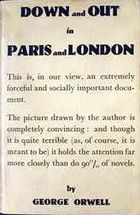Chapters I - XXIII (Paris)
After the various ordeals of unemployment and hunger Orwell obtains a job as a plongeur (dishwasher) in the 'Hotel X' and begins working long hours. In chapter XIV he describes the frantic and seemingly chaotic workings of the hotel as he understands it. He goes on to talk of his routine life as one of the working poor in Paris: slaving and sleeping, then drinking on Saturday night until the early hours of Sunday morning - the 'one thing that made life worth living' for some of the unmarried men of the quarter. In chapter XVI Orwell characterises the semi-autonomous existence by referencing a murder that was committed outside the hotel where he stays 'just beneath my window'. '[T]he thing that strikes me in looking back', he says, 'is that I was in bed and asleep within three minutes of the murder... We were working people and where was the sense of wasting sleep over murder?'
Misled by Boris's optimism, Orwell is briefly penniless again after he and Boris quit their hotel jobs in the expectation of work at a new restaurant, the 'Auberge de Jehan Cottard', where Boris feels sure he will be a waiter again. (At the hotel he had been doing lower grade work.) Boris explains that the "patron", 'an ex-colonel of the Russian Army,' seems to have financial difficulties - Orwell is not paid for ten days and spends a night on a bench rather than face his landlady over rent. 'It was very uncomfortable - the arm of the seat cuts into your back - and much colder than I had expected.'
In chapter XXII, Orwell considers the life of a "plongeur":
Chapters XXIV - XXXVIII (London)
"At present I do not feel that I have seen more than the fringe of poverty. Still I can point to one or two things I have definitely learned by being hard up. I shall never again think that all tramps are drunken scoundrels, nor expect a beggar to be grateful when I give him a penny, nor be surprised if men out of work lack energy, nor subscribe to the Salvation Army, nor pawn my clothes, nor refuse a handbill, nor enjoy a meal at a smart restaurant. That is a beginning.
![]() Copyright(c) 2007
- 2012. All rights reserved.
Copyright(c) 2007
- 2012. All rights reserved.

| Author | George Orwell |
|---|---|
| Country | United Kingdom |
| Language | English |
| Publisher | Victor Gollancz (London) |
| Publication Date | 9 January 1933 |